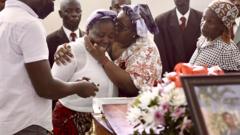In the heart of Mozambique's capital, Maputo, a somber atmosphere enveloped a cemetery filled with tearful children mourning their loss. The tragic death of 16-year-old Antonio Juaqim became a stark representation of the increasing turmoil in the country, which is grappling with the aftermath of a contentious presidential election where the ruling party, Frelimo, claimed victory. Eyewitness accounts reveal that Antonio was shot while participating in a protest organized by opposition supporters, defying the election results that awarded a significant majority to Frelimo's candidate, Daniel Chapo.
Uncle Manuel Samuel recounted the harrowing details of his nephew's death, stating he was shot in the mouth, with the bullet exiting through the back of his head. Surveillance footage reportedly captured police engaging with protesters, raising alarm about the state's use of force. Following the elections, protests erupted as many questioned the legitimacy of the results, claimed by main opposition figure Venâncio Mondlane to be manipulated. Mondlane, who fled to avoid arrest, has been urging citizens to voice their discontent, leading to nightly protests where residents bang pots and pans at 21:00.
Antonio's funeral underscored the impact of this violence on an entire generation, with funeral goers planting flowers on his grave and releasing balloons as vibrant reminders of his youth. The pain was palpable, not only for Antonio's family, but for many who share their fear of growing violence; Samuel recalled several young bodies at the morgue, representing a grim outlook for the country's youth.
Human Rights Watch has reported that more than 40 people—including at least 10 children—have lost their lives due to police actions amid the protests. In response, police commander Bernadino Raphael shifted blame onto Mondlane's supporters, accusing them of using children as shields during clashes. The atmosphere remains one of increasing anxiety, with citizens feeling that their future is at stake as they navigate the volatility of political dissent.
Analysts pinpoint this unrest as unprecedented, marking a significant shift in the political landscape. Young Mozambicans articulate a desire for basic needs—jobs and vocational training—over political allegiances rooted in historical struggles. The public sentiment is shifting away from loyalty to parties and instead to a vision of economic independence.
Chapo has declared that the election was carried out fairly, opting for a low profile since the ballot results were announced. The tumultuous situation continues to unfold as Mondlane's supporters gather to honor the deceased and rally for justice, holding on to the hope that their cries might resonate amid Mozambique's darkest days in decades. As the country processes the aftermath of this election, all eyes remain on how the government will respond to an increasingly desperate populace demanding change.





















